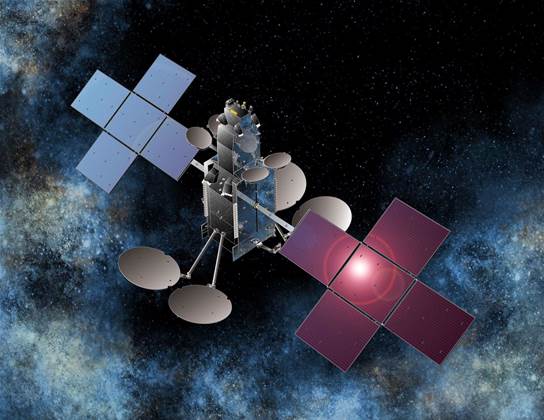NBN Co has finalised a $620 million contract with the satellite construction arm of US-based Loral Space & Communications for two satellites to serve remote Australian premises by 2015.

The satellites, to replace the interim 6 Mbps service NBN Co launched last July, will be constructed in California and launched under a separate tender to be released shortly.
Under the contract, Loral - which has also built satellites for NBN interim service contractors Optus and IPSTAR - will supply the satellites as well as telemetry, tracking and command systems required to maintain them.
The satellites will provide 90 Gbps of combined throughput once launched and will be used to provide a 12 Mbps downstream and 1 Mbps upstream service to consumers.
NBN Co chief technology officer Gary McLaren told iTnews the company planned to "test all options to see what we can do for a higher speed".
Though seven months after NBN Co initially planned to order the satellites, the $620 million cost falls significantly short of the $1 billion chief executive Mike Quigley has previously indicated the company would spend on satellite construction.
McLaren said a two-year competitive procurement process led to the savings.
It is understood the tender process was pushed back at least twice after NBN Co formed a shortlist between Loral and European satellite builder Thales last year.
A further $1.4 billion is expected to be spent on launching the satellites and building the earth stations for satellite connectivity before 2015.
Kacomm bid revived?
Though NBN Co expects to spend the next three years building and launching the long-term satellite service, the planned product bears remarkable similarities to a five-year-old bid along similar lines.
Quigley has previously confirmed NBN Co received pitches from Australian company Kacomm in early 2010 on a plan to launch two Ka-band satellites to serve rural and remote Australia and New Zealand with speed claims reaching as high as 30 Mbps downstream and 6 Mbps per user.
The company, led by former satellite consultants, had secured four lucrative orbital satellite slots in the Ka frequency bands from the International Telecommunications Union over Australia in 2009.
The satellites were to be constructed by Loral with help from satellite consultancy Hughes and an unnamed local provider.
Kacomm told the 2007 Regional Independent Telecommunications Review - referred to as the "Glasson Review" - that the planned $615 million solution would provide "a completely new nationwide communications infrastructure, independent of existing terrestrial infrastructure".
Loral took out a major shareholding in Australian company Kacomm in 2009 but the consortium has since fallen silent.
Former chairman and ANZ board member Dr Gregory Clark could not be contacted at time of writing.
NBN Co has separately secured its own orbital satellite slots for the long-term service and McLaren refused to confirm whether Kacomm plans had been included in the Loral bid.
However, he said Kacomm was consulted when planning NBN Co's long-term satellite service.
"We were very much looking to see what sort of capacity other private companies or any other companies will be looking to put into the market over the next couple of years," he said.
"We have tested all those options and actually part of the procurement process looked at what capacity Kacomm and other companies [have]."


_(20).jpg&h=140&w=231&c=1&s=0)
_(33).jpg&h=140&w=231&c=1&s=0)
.png&h=140&w=231&c=1&s=0)






 iTnews Executive Retreat - Security Leaders Edition
iTnews Executive Retreat - Security Leaders Edition
 iTnews Benchmark Awards 2026
iTnews Benchmark Awards 2026
 iTnews Cloud Covered Breakfast Summit
iTnews Cloud Covered Breakfast Summit
 The 2026 iAwards
The 2026 iAwards












_(1).jpg&h=140&w=231&c=1&s=0)



